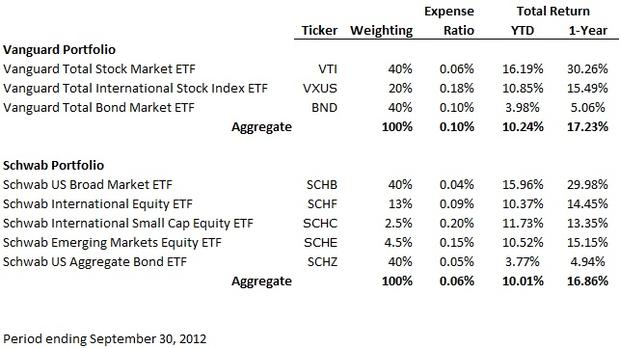ETF smackdown: Schwab versus Vanguard - part 2
(MoneyWatch) Earlier this week I compared Charles Schwab and Vanguard exchange-traded funds. Since I've received questions about which firm's ETFs are best, I decided to delve deeper into the two ETF fund families.
To that end, I constructed a broad portfolio I call the moderate Second Grader Portfolio. It consists of three asset classes: a total U.S. stock index, a total international stock index and a total bond index ETF. I've been using these three Vanguard funds for years.
Round one -- simplicity: Vanguard
When building the Schwab portfolio, I quickly realized I would need three international funds to construct a total international index. The Schwab International Equity ETF (SCHF) only offers developed countries. I needed to add the Schwab Emerging Markets ETF (SCHE) and the Schwab International Small Cap ETF (SCHC) to build a total international index. Schwab's managing director of ETFs, Eric Pollackov, confirmed that approach to building the portfolio. That means the Schwab portfolio will need more trading for rebalancing than the Vanguard fund.
Round two -- expense ratio: Schwab
Building this portfolio averaged 0.10 percent for Vanguard, but only 0.06 percent for Schwab.
Round three -- total fees: draw
There are more to fees than expense ratios. ETFs have bid-ask spreads and often trade at a premium or discount to the net asset value (NAV) of the underlying securities. Vanguard's funds were lower for a one-year holding period, but over a longer period that might not be the case. I'm calling this a draw.
Round four -- past performance: Vanguard
I asked both Vanguard and Schwab to show me the past performance differentials of the ETF portfolio I constructed, basing that comparison on the NAVs so as to remove the bid-ask spreads and the premiums and discounts.
Vanguard responded with the data below, which shows a large advantage for Vanguard amounting to 0.37 percentage point over one year. As they say, of course, past performance is not indicative of future performance. The funds use different indexes with the exception of Vanguard's total bond funds, which had a 0.12 percentage point advantage. Vanguard also just announced it was changing indexes for the two stock funds.
- Schwab vs Vanguard - part I
- Vanguard beats index, before costs
- Edelman accuses Vanguard of hiding fees
Schwab's Pollackov pointed out that Vanguard's international fund uses something called fair-value pricing, while Schwab's funds don't. Fair-value pricing adjusts the NAV of international funds in earlier time zones based on U.S. market changes. But over long periods of time, this has little impact.
Round five -- tracking error: Vanguard
Though only time will tell which fund family will have better tracking error, two factors lead me to think that Vanguard will be superior. Tracking error refers to how far the funds vary from the underlying indexes they follow. First, Vanguard has $645 billion in the index funds that have ETF share classes. This compares to only $12.5 billion for Schwab. This means Schwab must do more sampling, commonly called "optimization" by the index fund industry. For example, the Vanguard U.S. fund holds 3,295 stocks, while the Schwab fund holds 1,925 stocks. More sampling means more error.
The second reason to think Vanguard will fare better when it comes to tracking error has to do with the history of indexing. It's a key focus at Vanguard, and I've previously noted how the firm has consistently bested the index benchmarks due to the use of futures and securities lending. Pollackov confirmed that Schwab's U.S. stock fund had some negative tracking error, but said it was less than 0.10 percent annually.
The winner
This clash of the low-fee investment titans was a spectacular contest, with both participants coming out much better than slaughters where last year's hot active funds badly underperform the low-cost index funds. Both Schwab and Vanguard ETFs are well constructed, have ultra-low fees and are terrific vehicles for investors. Though at this point I give the edge to Vanguard, I'll be taking another look next year. Perhaps iShares will enter the fight as well.
